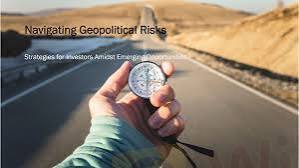
2024-12-26 04:41
IndustryNAVIGATING GEOPOLITIC RISK IN INVESTMENT DECISION
#ANNUALINVESTMENTSHARINGMICHRICHES#
Geopolitical risks, such as international conflicts, trade tensions, political instability, and regulatory changes, can significantly impact global financial markets and investment decisions. Investors must adopt proactive strategies to mitigate potential risks while capitalizing on opportunities. Here’s how to navigate geopolitical uncertainties effectively:
1. Diversification Across Regions and Assets
Why it matters: Spreading investments across multiple countries and asset classes reduces exposure to localized risks.
How to apply: Include international equities, bonds, commodities, and alternative investments in your portfolio.
2. Focus on Defensive Sectors
Why it matters: Sectors like healthcare, utilities, and consumer staples are less sensitive to geopolitical disruptions.
How to apply: Allocate a portion of your portfolio to these sectors for stability during uncertain times.
3. Monitor Safe-Haven Assets
Why it matters: Gold, U.S. Treasuries, and the Swiss franc often gain value during geopolitical crises.
How to apply: Consider a tactical allocation to these assets as a hedge against volatility.
4. Leverage Geopolitical Intelligence
Why it matters: Staying informed about geopolitical developments enables better decision-making.
How to apply: Use reliable news sources, research reports, and geopolitical risk assessments to guide investments.
5. Adjust Currency Exposure
Why it matters: Currency fluctuations can amplify risks during geopolitical turmoil.
How to apply: Hedge currency risks through futures, options, or diversified currency exposure.
6. Incorporate Scenario Planning
Why it matters: Preparing for various geopolitical outcomes helps mitigate surprises.
How to apply: Analyze potential impacts of scenarios like trade wars, sanctions, or military conflicts on portfolio performance.
7. Adopt a Long-Term Perspective
Why it matters: Short-term volatility driven by geopolitical events often smoothens out over time.
How to apply: Focus on long-term fundamentals instead of reacting to temporary market shocks.
8. Engage in Active Management
Why it matters: Active strategies can adapt more dynamically to geopolitical changes than passive ones.
How to apply: Work with fund managers who specialize in navigating geopolitical risks.
9. Maintain Adequate Liquidity
Why it matters: Liquidity ensures flexibility to adjust positions during market turmoil.
How to apply: Keep a portion of the portfolio in cash or highly liquid assets.
10. Understand Regional Risk Profiles
Why it matters: Different regions have unique risk factors tied to their geopolitical context.
How to apply: Analyze exposure to regions with higher political or economic instability.
Key Takeaways
Balance Risk and Opportunity: While geopolitical risks can lead to market instability, they may also present investment opportunities.
Stay Informed and Flexible: A well-informed and adaptable approach is critical to managing the uncertainties of global events.
Focus on Risk Management: Protecting capital through diversification, hedging, and defensive strategies is essential.
By integrating these practices, investors can build resilient portfolios that navigate geopolitical risks effectively while pursuing sustainable growth.
Like 0
Tescy
Trader
Hot content
Industry
Event-A comment a day,Keep rewards worthy up to$27
Industry
Nigeria Event Giveaway-Win₦5000 Mobilephone Credit
Industry
Nigeria Event Giveaway-Win ₦2500 MobilePhoneCredit
Industry
South Africa Event-Come&Win 240ZAR Phone Credit
Industry
Nigeria Event-Discuss Forex&Win2500NGN PhoneCredit
Industry
[Nigeria Event]Discuss&win 2500 Naira Phone Credit
Forum category

Platform

Exhibition

Agent

Recruitment

EA

Industry

Market

Index
NAVIGATING GEOPOLITIC RISK IN INVESTMENT DECISION
 Nigeria | 2024-12-26 04:41
Nigeria | 2024-12-26 04:41#ANNUALINVESTMENTSHARINGMICHRICHES#
Geopolitical risks, such as international conflicts, trade tensions, political instability, and regulatory changes, can significantly impact global financial markets and investment decisions. Investors must adopt proactive strategies to mitigate potential risks while capitalizing on opportunities. Here’s how to navigate geopolitical uncertainties effectively:
1. Diversification Across Regions and Assets
Why it matters: Spreading investments across multiple countries and asset classes reduces exposure to localized risks.
How to apply: Include international equities, bonds, commodities, and alternative investments in your portfolio.
2. Focus on Defensive Sectors
Why it matters: Sectors like healthcare, utilities, and consumer staples are less sensitive to geopolitical disruptions.
How to apply: Allocate a portion of your portfolio to these sectors for stability during uncertain times.
3. Monitor Safe-Haven Assets
Why it matters: Gold, U.S. Treasuries, and the Swiss franc often gain value during geopolitical crises.
How to apply: Consider a tactical allocation to these assets as a hedge against volatility.
4. Leverage Geopolitical Intelligence
Why it matters: Staying informed about geopolitical developments enables better decision-making.
How to apply: Use reliable news sources, research reports, and geopolitical risk assessments to guide investments.
5. Adjust Currency Exposure
Why it matters: Currency fluctuations can amplify risks during geopolitical turmoil.
How to apply: Hedge currency risks through futures, options, or diversified currency exposure.
6. Incorporate Scenario Planning
Why it matters: Preparing for various geopolitical outcomes helps mitigate surprises.
How to apply: Analyze potential impacts of scenarios like trade wars, sanctions, or military conflicts on portfolio performance.
7. Adopt a Long-Term Perspective
Why it matters: Short-term volatility driven by geopolitical events often smoothens out over time.
How to apply: Focus on long-term fundamentals instead of reacting to temporary market shocks.
8. Engage in Active Management
Why it matters: Active strategies can adapt more dynamically to geopolitical changes than passive ones.
How to apply: Work with fund managers who specialize in navigating geopolitical risks.
9. Maintain Adequate Liquidity
Why it matters: Liquidity ensures flexibility to adjust positions during market turmoil.
How to apply: Keep a portion of the portfolio in cash or highly liquid assets.
10. Understand Regional Risk Profiles
Why it matters: Different regions have unique risk factors tied to their geopolitical context.
How to apply: Analyze exposure to regions with higher political or economic instability.
Key Takeaways
Balance Risk and Opportunity: While geopolitical risks can lead to market instability, they may also present investment opportunities.
Stay Informed and Flexible: A well-informed and adaptable approach is critical to managing the uncertainties of global events.
Focus on Risk Management: Protecting capital through diversification, hedging, and defensive strategies is essential.
By integrating these practices, investors can build resilient portfolios that navigate geopolitical risks effectively while pursuing sustainable growth.
Like 0
I want to comment, too
Submit
0Comments

There is no comment yet. Make the first one.

Submit
There is no comment yet. Make the first one.